The Canadian-American Poetry Wars
Back in the 1970s, it was the ultimate in Canadian fashion to traipse around Europe with a Canadian flag sewn to your backpack. You wouldn’t, you see, be mistaken for an American.

Canadian Backpack In Thailand
In the New World Order, a Canadian Flag is No Longer Enough
But, that’s the Canadian way. I’ve been in the Geneva airport, when a soldier kneeled down in the middle of the waiting hall and changed a clip in his submachine gun. I’ve been in the Amsterdam airport, with the suitcases spread out on the asphalt below the plane. I had to identify my suitcases to a heavily armed soldier, before I could board. And in Vancouver, Canada? In Vancouver they make you wait. That’s the ticket. A half hour at customs (30 seconds in Amsterdam), and you’re ready to give yourself away, I tell you. By the time it’s your turn in line, you’ve been observed, filmed, and observed again. They got your number.
Piece of cake, really.
This is called the sweat-it-out method of security.
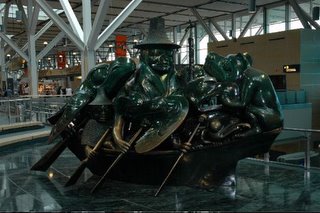
Raven, Grizzly Bear, and Friends Paddling Through the Sweat
Security detail at the Vancouver International Airport
Sculpture by Bill Reid
Sometimes, of course, people get through. Hey, no one’s perfect.
Oh, dear. Well, there’s a long history of Canada going it alone, isn’t there. After all, when Ezra Pound was shacked up in Europe, creating modern poetry, what were the Canadian poets doing, exactly?
Well, um, yeah. Well, Al Purdy was flying around over Europe looking for Ezra’s friends, that’s what. He only became a poet after that experience.
Here’s a picture of Purdy demonstrating his flying technique, from Forget Magazine.
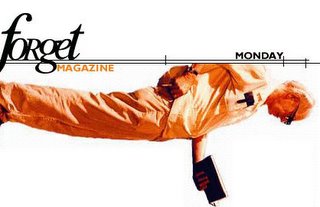
Al Purdy Preparing to Drop a Poetry Bomb
Canada: the low-tech answer to global security. This picture heads a lyrical memoir of Al Purdy.
Ain’t that just the thing, though.
You see, Canada is big. Canada has more geography than people. Canada has more cows than people. Canada has more potholes in more roads than people. While Walt Whitman and friends were singing America into the West, Canada was still trying to map its west.
So, by the time civilization got to Ezra Pound, who kneeled at Whitman’s feet, and went on to make a map of civilization, mostly so he could blow the whole project up, and, get this, save it that way!, Canada was still fussing around with visual poetry.
The poems they used proved to be pretty good. Way better than the darned WWII bombsights. Those couldn’t hit the broad side of a barn door. Heck, they couldn’t even hit the barn.

Norden Bombsight from World War II
Barn Doors proved to be quite safe.
Yes sirree, while American pilots were busy writing, and reading, poetry about their bombsights, Canadians were off putting them to the test in real Poetry Slam conditions.
Don’t believe me that the Americans were being more dutiful about their poetry? Here is a poetry excerpt from the Pilot Training Manual of the B-17 Flying Fortress. Notice the very Whitmanesque phrasing:

American Pilots taking the Oath
before being shown their bombsight.
Doesn’t it all remind you just a little bit of Monty Python’s Holy Hand Grenade?
More to the point: are you tempted to build your own?
Meanwhile, back on the ranch, without fanfare, here’s an example of a map the Canadians used to locate Pound’s friends and blow them, preferably, to hell.
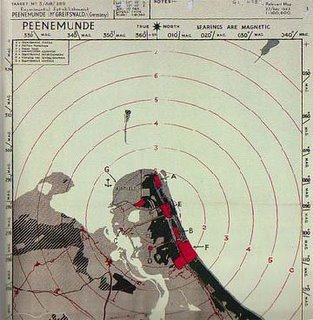
Top Secret British Bombing Map of the Peenemünde Rocket Site in WWII
Poetry, that’s to say Pound’s poetry, had gone nuclear, and it had to be stopped. The Canadians saw that.
This was years before Iraq. This was years before Iran. This was before Korea, China, India, Pakistan, and Israel.
Canada has always been interested in keeping the peace.
Well, almost.

Canadian Songwriter Stan Rogers
Wishing He, Too, could take the Northwest Passage.
The Germans, Pound’s buddies in taking poetry to the people, wound up building their reactor in a schoolhouse in Stadtilm, a small town south of Berlin, instead of locating it to the now-compromised Peenemünde. Poetry, after all, has been kept alive by the school system for a long, long time.
In fact, splinters of wood and radioactive paraffin from the explosion of one of their failed reactor experiments still lie scattered around in the yard.
Yes, without heavy water, the Germans resorted to paraffin to slow down their reaction, so that it didn’t blow up. Who knew!
Paraffin is the favourite fuel of fire breathers. It works great in candles, too, and in hybrid rockets, and is just great for manicures and pedicures, but it’s not so good at cooling down a nuclear reactor, except maybe to make them smell nice. Here are some basic recipes.
Oops.
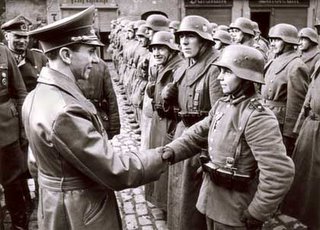
One of the School Boys Expelled
to Make Way for the German Nuclear Project?
Minister of Propaganda Joseph Goebels Shaking the Hand
of a Hitler Youth Off to Find Free Verse
What then, indeed. It must have been hard to have been a poet in that time.
I mean, look at this:

Poetry Control Panel from B-17 Bomber
It all started with the Dadaists and their automatic writing.
Here’s a picture from the anti-art magazine Der Dada, showing a German prototype of the poetry autopilot in action. (Notice how Dada-- Nonsense -- comes lovingly out of the autopilot's inky mouth, just like, well, data.)
A quick comparison with the American version above ought to make it clear why the Germans lost the war.
Ok, I’ll give the ending away. I’ll tell you what happens: down in Italy, Pound ran out of paraffin candles, and had to turn on the electric light.
Eve (waking languorously in Hamlet’s garden): Gasp!
This was in the last days of WWII, when Hitler was stalling, trying to keep the war going long enough to finish his Atomic bomb.
Apparently he did. In his book Hitlers Bombe, historian Rainer Karsch proposes that German atomic scientists had created, well, a bazooka shell, basically, powered by two ounces of heavy water, that would blow up a lot more than a tank.
By that time, Pound was already in jail for reading the world as a poem.
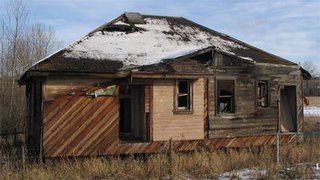
The 150 Mile House, B.C. Courthouse
Justice: As a Poet Sees It
Once you invent an atomic bomb, someone is always going to try to get you to go back and live in a book instead.
Who said that art didn’t have its risks? Sheesh.
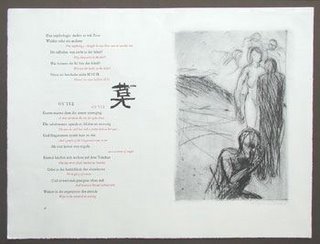
Pound Stuck Back Into a Book
and Taking it Hard
A German Edition of Pound’s Pisan Cantos
(First published when Pound was incarcerated
in St. Elizabeth's Hospital for the Criminally Insane.)
Why was that?
Oh, the usual thing.
Here he is, speaking to the BBC, outlining his antipathy towards all forms of bureaucracy.
Dangerous work.
Yeah, tell me about it. I was in Copenhagen the day this baby blew, and dropped bits of itself over me.
I didn’t exactly glow in the dark, but, well, still.
Still.
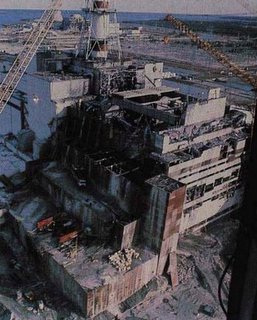
The Chernobyl Reactor After the Poets Turned Off All the Safety Controls and Played Around
They grew the greatest strawberries there once.
Here’s what Chernobyl writer Vesa Goldsworthy has to say about that little poetic experiment, in her memoir Chernobyl Strawberries:
Who knew.
Damn, but the poets have a lot to answer for.
Next Week: The American-Canadian Dispute Over the Northwest Passage, and Detailed Plans for Pound’s Bomb, so You can Build one at home, and Drive it Away in comfort.
Sneak Preview:
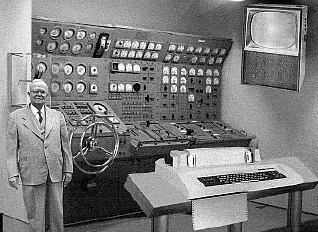
Early Desktop computer, complete With Steering Wheel
for easier cornering around line breaks. 1949.
(Next week find out how Pound had a far simpler system. Sheesh.)
If you need something done, ask an experimental poet. Even if he’s in the nut house.

In the New World Order, a Canadian Flag is No Longer Enough
We got here, what, the Ontario flag (maple leaf), the Quebec flag (fleur de lys), and a stuffed moose with, what’s that? Oak leaf antlers?
But, that’s the Canadian way. I’ve been in the Geneva airport, when a soldier kneeled down in the middle of the waiting hall and changed a clip in his submachine gun. I’ve been in the Amsterdam airport, with the suitcases spread out on the asphalt below the plane. I had to identify my suitcases to a heavily armed soldier, before I could board. And in Vancouver, Canada? In Vancouver they make you wait. That’s the ticket. A half hour at customs (30 seconds in Amsterdam), and you’re ready to give yourself away, I tell you. By the time it’s your turn in line, you’ve been observed, filmed, and observed again. They got your number.
Piece of cake, really.
This is called the sweat-it-out method of security.

Security detail at the Vancouver International Airport
Sculpture by Bill Reid
Sometimes, of course, people get through. Hey, no one’s perfect.
Oh, dear. Well, there’s a long history of Canada going it alone, isn’t there. After all, when Ezra Pound was shacked up in Europe, creating modern poetry, what were the Canadian poets doing, exactly?
Well, um, yeah. Well, Al Purdy was flying around over Europe looking for Ezra’s friends, that’s what. He only became a poet after that experience.
Here’s a picture of Purdy demonstrating his flying technique, from Forget Magazine.

Canada: the low-tech answer to global security. This picture heads a lyrical memoir of Al Purdy.
Ain’t that just the thing, though.
You see, Canada is big. Canada has more geography than people. Canada has more cows than people. Canada has more potholes in more roads than people. While Walt Whitman and friends were singing America into the West, Canada was still trying to map its west.
So, by the time civilization got to Ezra Pound, who kneeled at Whitman’s feet, and went on to make a map of civilization, mostly so he could blow the whole project up, and, get this, save it that way!, Canada was still fussing around with visual poetry.
The poems they used proved to be pretty good. Way better than the darned WWII bombsights. Those couldn’t hit the broad side of a barn door. Heck, they couldn’t even hit the barn.

Barn Doors proved to be quite safe.
Yes sirree, while American pilots were busy writing, and reading, poetry about their bombsights, Canadians were off putting them to the test in real Poetry Slam conditions.
(In the view of its exponents, the point of slam is to challenge the authority of anyone who pretends to know absolutely what literary quality is. So sayeth Wikipedia.)
Don’t believe me that the Americans were being more dutiful about their poetry? Here is a poetry excerpt from the Pilot Training Manual of the B-17 Flying Fortress. Notice the very Whitmanesque phrasing:
He must know and understand his bombsight, what it does, and how it does it.
He must thoroughly understand the operation and upkeep of his bombing instruments and equipment.
He must know that his racks, switches, controls, releases, doors, linkage, etc., are in first class operating condition.
He must understand the automatic pilot as it pertains to bombing.
He must know how to set it up, make any adjustments and minor repairs while in flight.
He must know how to operate all gun positions in the airplane.
He must know how to load and clear simple stoppages and jams of machine guns while in flight.
He must be able to load and fuse his own bombs.
He must understand the destructive power of bombs and must know the vulnerable spots on various types of targets.
He must understand the bombing problem, bombing probabilities, bombing errors, etc.
He must be thoroughly versed in target identification and in aircraft identification.

before being shown their bombsight.
Doesn’t it all remind you just a little bit of Monty Python’s Holy Hand Grenade?
More to the point: are you tempted to build your own?
Meanwhile, back on the ranch, without fanfare, here’s an example of a map the Canadians used to locate Pound’s friends and blow them, preferably, to hell.

When the British and Canadians Bombed this Rocket Factory, they killed mostly the concentration camp inmates who were building the future headquarters of the German Atomic Project.
Poetry, that’s to say Pound’s poetry, had gone nuclear, and it had to be stopped. The Canadians saw that.
This was years before Iraq. This was years before Iran. This was before Korea, China, India, Pakistan, and Israel.
Canada has always been interested in keeping the peace.
Well, almost.

Wishing He, Too, could take the Northwest Passage.
Ah, for just one time I would take the Northwest Passage
To find the hand of Franklin reaching for the Beaufort Sea;
Tracing one warm line through a land so wild and savage
And make a Northwest Passage to the sea. Stan Rogers.
(More on that next week, folks.)
The Germans, Pound’s buddies in taking poetry to the people, wound up building their reactor in a schoolhouse in Stadtilm, a small town south of Berlin, instead of locating it to the now-compromised Peenemünde. Poetry, after all, has been kept alive by the school system for a long, long time.
In fact, splinters of wood and radioactive paraffin from the explosion of one of their failed reactor experiments still lie scattered around in the yard.
Yes, without heavy water, the Germans resorted to paraffin to slow down their reaction, so that it didn’t blow up. Who knew!
Paraffin is the favourite fuel of fire breathers. It works great in candles, too, and in hybrid rockets, and is just great for manicures and pedicures, but it’s not so good at cooling down a nuclear reactor, except maybe to make them smell nice. Here are some basic recipes.
Oops.

to Make Way for the German Nuclear Project?
Minister of Propaganda Joseph Goebels Shaking the Hand
of a Hitler Youth Off to Find Free Verse
Ezra said he could write better propaganda than this man.
The third guy in thinks so, too, but the second guy, he’s not so sure about this art thing. After all, when the artists start using real bullets, what then?
What then, indeed. It must have been hard to have been a poet in that time.
I mean, look at this:

It all started with the Dadaists and their automatic writing.
Here’s a picture from the anti-art magazine Der Dada, showing a German prototype of the poetry autopilot in action. (Notice how Dada-- Nonsense -- comes lovingly out of the autopilot's inky mouth, just like, well, data.)
A quick comparison with the American version above ought to make it clear why the Germans lost the war.
Ok, I’ll give the ending away. I’ll tell you what happens: down in Italy, Pound ran out of paraffin candles, and had to turn on the electric light.
Eve (waking languorously in Hamlet’s garden): Gasp!
This was in the last days of WWII, when Hitler was stalling, trying to keep the war going long enough to finish his Atomic bomb.
Apparently he did. In his book Hitlers Bombe, historian Rainer Karsch proposes that German atomic scientists had created, well, a bazooka shell, basically, powered by two ounces of heavy water, that would blow up a lot more than a tank.
By that time, Pound was already in jail for reading the world as a poem.

Justice: As a Poet Sees It
Once you invent an atomic bomb, someone is always going to try to get you to go back and live in a book instead.
Who said that art didn’t have its risks? Sheesh.

and Taking it Hard
A German Edition of Pound’s Pisan Cantos
(First published when Pound was incarcerated
in St. Elizabeth's Hospital for the Criminally Insane.)
Why was that?
Oh, the usual thing.
Here he is, speaking to the BBC, outlining his antipathy towards all forms of bureaucracy.
Dangerous work.
Yeah, tell me about it. I was in Copenhagen the day this baby blew, and dropped bits of itself over me.
I didn’t exactly glow in the dark, but, well, still.
Still.

I live with abandon!
I live, breathing you!
And for you, I am ready to go
into the inferno again!
But with merciful hands you extinguish
the fatal fire under me.
My beloved,
may God protect you!
May the flame of the redeemed soul shield you!
Libuov Sirata, from Chernobyl Poems
They grew the greatest strawberries there once.
Here’s what Chernobyl writer Vesa Goldsworthy has to say about that little poetic experiment, in her memoir Chernobyl Strawberries:
Chernobyl Strawberries is, on the face of it, a narrative that has frequently been written before: intellectual grows up under communism before making new life on cushier side of Iron Curtain. Its author is conscious that she has none of the usual horror stories to offer the Amnesty diehards and Schadenfreude junkies who form the genre's traditional fan base. "I have never seen the inside of a prison cell," Vesna Goldsworthy warns, "never been tortured for any beliefs. I didn't escape to the West under a train or through barbed-wire fences. Much though I would have liked to, I've never had to memorize any poetry." Listen.
Who knew.
Damn, but the poets have a lot to answer for.
Next Week: The American-Canadian Dispute Over the Northwest Passage, and Detailed Plans for Pound’s Bomb, so You can Build one at home, and Drive it Away in comfort.
Sneak Preview:

for easier cornering around line breaks. 1949.
(Next week find out how Pound had a far simpler system. Sheesh.)
If you need something done, ask an experimental poet. Even if he’s in the nut house.
"Computers are useless. They can only give you answers."
Pablo Picasso

1 Comments:
I am a little suspicious about your reasons for not mentioning Gertrude Stein and her machine. You know the machine I mean.
Post a Comment
<< Home